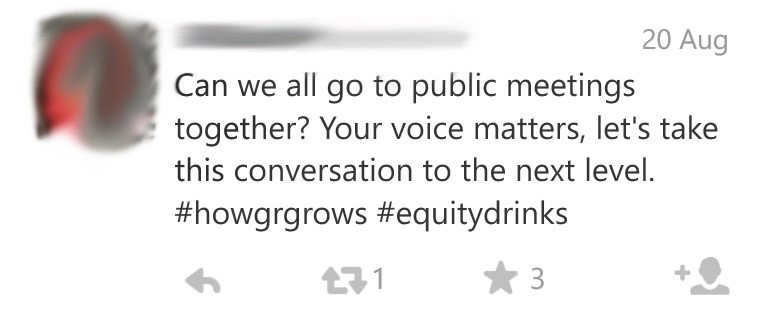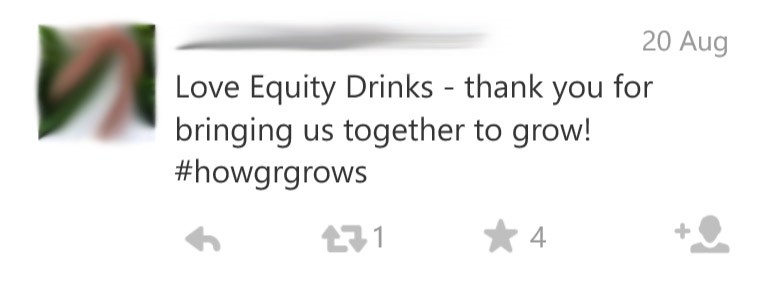Polite society makes conflict a dirty word, a dangerous omen — something to be either avoided or tranquilized. When faced with conflict, there are always groups (whether formal organizations or social cliques) that seek to smooth over dissent while still maintaining the appearance of inclusiveness. So in a time when conflict about policing and gentrification has been rising and threatening the status quo, it’s useful to identify the inevitable attempts at controlling this conversation.
Recently, there has been a rash of forums and panels in Grand Rapids on the topics of development, gentrification, racism, and policing. Noteworthy among these was the August 20th “How We Grow” forum organized at Wealthy Theatre by the group Equity Drinks. It was sponsored in part by Spectrum Health and Bear Manor Properties, the latter most conspicuous for their enthusiastic commitment to development in the Wealthy Street corridor. The event was billed as a community panel discussion, and focused on the ongoing developments taking place in Grand Rapids and the related issues of displacement and inequality.
Despite the open doors and the anticipation of an informal community discussion, there were layers of mediation between the participants and the panelists. The least subtle of these was the heavy moderation, typical of forums like this, which shaped the content and the direction of the conversation. The ways in which the event was structured and scheduled also meant that certain voices would necessarily be more present. Events like this are typically scheduled in the evenings, on the assumption that most attendees work 9-to-5. It seemed to be primarily promoted via Facebook, where in-the-know “concerned citizens” could share it with their friends but not many others. And as with all Equity Drinks events, there was a networking hour before the forum commenced — implying that most attendees would come from similar professional backgrounds and would know how to, much less want to, network with each other.
Technology provided yet another layer of mediation to the discussion. Behind the host and four panelists, a massive display of the event’s Twitter feed updated in real time with questions and comments from attendees, imparting a fragmented mood to the event. While attendees’ attentions bounced between the panelists, their phones, their Retweet counts, and the display, the panelists didn’t engage with the questions or comments from the Twitter feed very much.

Everything about the event, from the venue to the panelists, was respectable and safe, and so the people most comfortable engaging were respectable and safe. It’s not just formal organizations or companies that have an interest in quelling conflict, it is individuals as well. Locally, conversations about issues related to housing and development are often dominated by cliques of urbanists — an assemblage of neighborhood association members, aspiring politicians, urban planners and would-be urban planners, trendy business owners, local micro-celebrities, and their cohorts. These types are educated, tech-savvy, “green,” and typically self-identified liberals or progressives. They are cultured, glowing with civic pride, and utterly convinced that they are a part of the solution. They are diplomatically aware of their privilege, and yet simultaneously oblivious to how it lets them skillfully engage in more-or-less polite debates about things that others’ very survival depends upon.
These are the types that are the most comfortable engaging with discussions about development and gentrification, in the flesh and on social media, and who leave the most satisfied. To not engage would compromise their liberal sensibilities, but to take meaningful action beyond merely engaging and accommodating would compromise their stake in the economic growth. The sponsors of development, the sponsors of events discussing development, and the urbanist cliques that engage in these events become actors in a theatrical performance — though cast in opposing roles, behind the curtain they are members of the same company.
What should be immediately noticeable about the “How We Grow” event is that, if the intention is taken at face value, it was practically pointless. If one didn’t like the new developments and transformations taking place in the city, Tweeting about it wouldn’t do much. And for those who did accept or approve of the gentrification, lucky them — because it’s already happening!
But let’s give Spectrum Health and Bear Manor Properties a little credit here, the event was a bit more than a waste of time. By corralling people into a public discussion and encouraging criticism, a number of things are accomplished that are actually beneficial to the forces of gentrification.
For one, opposition is dulled into ineffectual criticism. First, a “we” is created, a contrived sense of community, and it’s implied that “we” have some nebulously-defined agency in affecting the outcome of gentrification. The terms of the conversation are set before it even takes place, most obviously in the name of the event itself, “How We Grow.” (As if growth is the only option.) By asking everyone to air their grievances, hostility towards gentrification is transformed through this false sense of community into an equally false sense of participation and inclusion. Antagonism towards gentrification then becomes critical dialogue within this “community.”
It’s obvious that not everyone in Grand Rapids benefits equally from what is proposed as growth, and that some are even hurt by it. Different people interact with this growth process in very different ways. Events like this acknowledge that point, but insist that we can move past any issues and move forward with the process if only everyone could participate in some way. Landlords and tenants, business owners and workers, and people who experience drastically different levels of privilege and power are suggested to be “in it together.”

In this way any conflict is reined in to a non-conversation. Then, the fact that the “conversation” happened can be used as proof that everyone’s voices and needs have been included and addressed — a rubber stamp on the original plan, whether or not it has actually been meaningfully affected by opposing voices. Organizers and moderators are lauded for talking about the tough issues, while the strongest opponents, or those most affected by the issues they’re discussing, are either side-stepped or glaringly absent from the conversation.
In addition to this process of recuperation, public forums on contentious issues act as a pressure release. The idea of a “public sphere” is an abstraction where everyone can supposedly contribute to an equal exchange of ideas. What’s insidiously behind this is the fact that there are powerful people, groups, and institutions which can produce a disproportionate amount of influence within this public sphere. Sound bytes and slogans are produced by think tank intellectuals and deployed by the media, politicians, and through social media to manipulate the most people in ways most beneficial to power, while many rant and rave on Facebook or in MLive comments to seemingly no effect. But it actually does have an effect – it reinvigorates and validates the sphere that power can then use to much more artfully manipulate.
Another effect of dutifully entering one’s critiques into the metaphorical suggestion box of these public forums is that it gives power the chance to form a response. Public relations people, various paid staff, and neighborhood boosters can hear what the complaints are and develop arguments and strategies to defuse them, all while the forces of gentrification go untouched or are even bolstered.
Events like “How We Grow” and the urbanist cliques and organizations that stage them ultimately seek to avoid social conflict. Those who sponsor these events have no reason not to believe that the current system works for everyone and they have an abiding faith in the idea that it will work for everyone—if they just make the right changes after the right collective decision is reached. Unfortunately, events like this often hide structural oppression, naively assuming that everyone has the same access to power or that everyone will be comfortable coming to them for help. At best, there may be a tweak or two proposed, but in the end, there is no path for meaningful action. There is self-reflective hand-wringing, i.e. “we need to do better” or wondering aloud (or at least on Twitter) if the restaurant we are eating at is “just” in light of the conversation that happened. But at the end of the day, nobody needs be too concerned, because the “conversation” happened and the performance of awareness has been staged, and everyone can go back to doing what they were doing.
